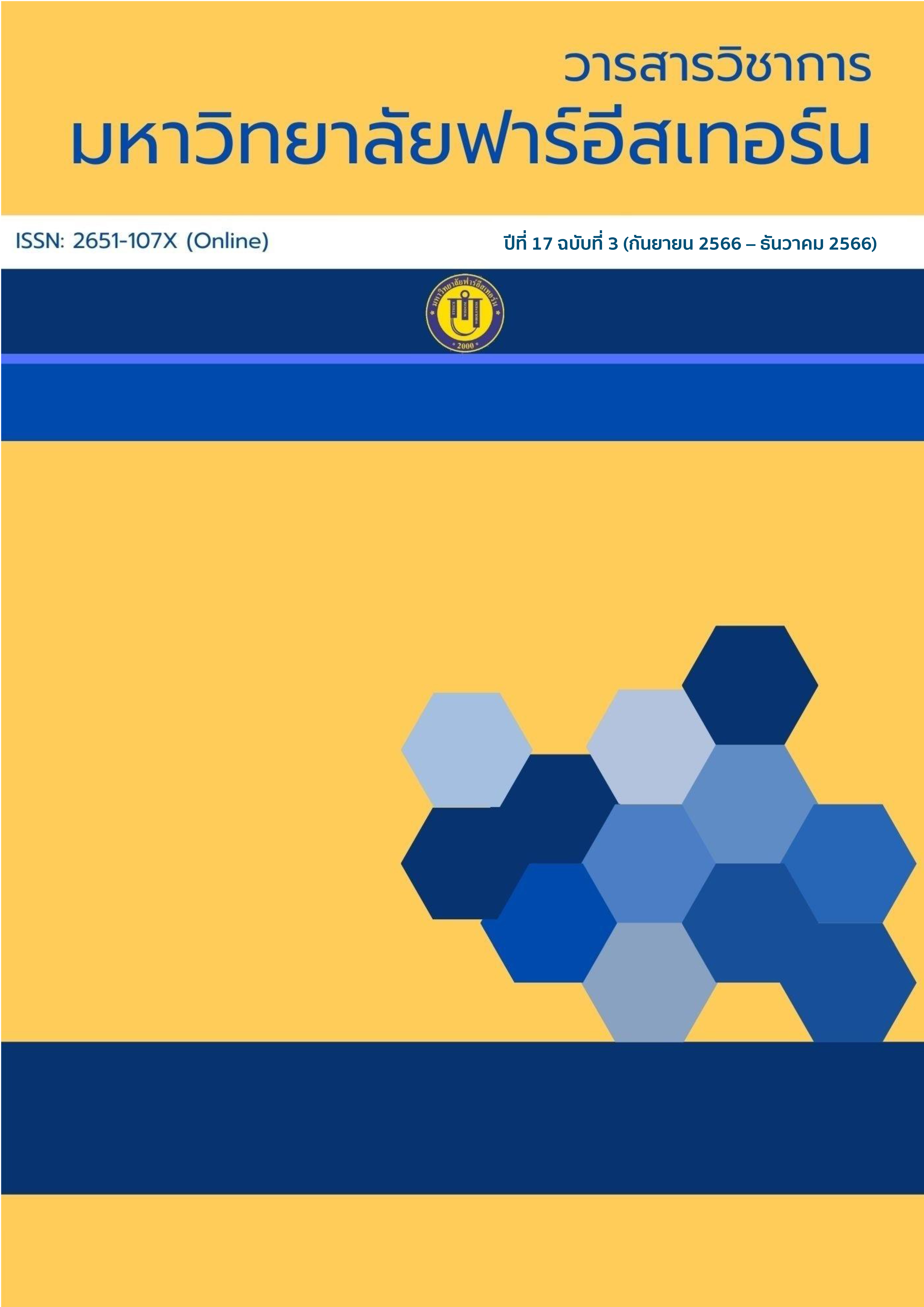Experiential Learning Management to Develop Geography Abilities of Grade 4 Students at Ban Rim Tai School, Chiang Mai Province
Main Article Content
Abstract
This study aimed to 1) create experiential learning plans on the topic of physical characteristics, 2) compare pre-post learning achievement of using experiential learning activities, and 3) develop geographic abilities in items of geological characteristics. The sample group was 35 Grade 4 students at Ban Rim Tai School, Chiang Mai Province, by random cluster sampling. The experimental instrument was a set of experiential learning plans on physical characteristics for the sample group. The percentage, average, standard deviation, coefficient of variation, and mode were used as statistical analysis. The results showed that 1) five developed experiential plans on the topic of physical characteristics (such as content, learning activity, instructional media, measurement and evaluation, and learning management pattern) were at a high level;2) after using the experiential learning plans, the mean score before learning was 8.83 and after learning was 15.00, indicating that the average learning achievement was higher than before; and 3) 74.29 percent of students had an ability at the highest level and were at a very good level of ability according to the results of geography ability analysis from their worksheets.
Article Details

This work is licensed under a Creative Commons Attribution-NonCommercial-NoDerivatives 4.0 International License.
1. Any views and comments in the Journal of Social Innovation and Lifelong Learning are the authors’ views. The editorial staff have not to agree with those views and it is not considered as the editorial’s responsibility.
2. The responsibility of content and draft check of each article belongs to each author. In case, there is any lawsuit about copyright infringement. It is considered as the authors’ sole responsibility.
3. The article copyright belonging to the authors and The Far Eastern University are copyrighted legally. Republication must be received direct permission from the authors and The Far Eastern University in written form.
References
กระทรวงศึกษาธิการ. (2551). หลักสูตรแกนกลางการศึกษาขั้นพื้นฐาน พุทธศักราช 2551. โรงพิมพ์คุรุสภา.
กระทรวงศึกษาธิการ. (2560). ตัวชี้วัดและสาระการเรียนรู้แกนกลาง สาระภูมิศาสตร์ (ฉบับปรับปรุง พ.ศ. 2560). โรงพิมพ์ชุมนุมสหกรณ์การเกษตรแห่งประเทศไทย.
กฤตนันน์ สามะพุทธิ. (2534). ปัญหาการสอนวิชาสังคมศึกษาในโรงเรียน. วารสารศึกษาศาสตร์ปริทัศน์, 8(2), 67-74.
https://kukrdb.lib.ku.ac.th/journal/index.php?/KERJ/search_detail/result/200547
กันตาภา สุทธิอาจ. (2561). การพัฒนารูปแบบการเรียนการสอนแบบเน้นประสบการณ์ตามสภาพจริงเพื่อส่งเสริมคุณลักษณะการเรียนด้วยการนำตนเอง ของนักเรียนชั้นมัธยมศึกษาตอนต้น [วิทยานิพนธ์ปริญญามหาบัณฑิต, มหาวิทยาลัยธุรกิจบัณฑิตย์].
นงนุช เสือพูมี, วัลทนี นาคศรีสังข์ และ ประไพพิศ สิงหเสม. (2560). การจัดการเรียนรู้แบบประสบการณ์ทางการพยาบาล. วารสารพยาบาลกระทรวงสาธารณสุข, 27(1), 12-21. https://he02.tci-thaijo.org/index.php/tnaph/article/view/84953
บันลือ กันพงษ์. (2561, ธันวาคม 5). การจัดการเรียนรู้ที่เน้นบทบาทและการมีส่วนร่วมของผู้เรียน (Active Learning) :การเรียนรู้เชิงประสบการณ์ (Experiential Learning). ระบบบริหารจัดการองค์ความรู้ Knowledge Management KM SK2 สำนักงานเขตพื้นที่การศึกษาประถมศึกษาสระแก้ว เขต 2. https://k.skarea2.go.th/?name=article&file=view&id=15
บุญชม ศรีสะอาด. (2546). การวิจัยสำหรับครู. สุวีริยาสาส์น.
บุญมา เวียงคำ และ เสนอ ภิรมจิตรผ่อง. (2560). การพัฒนารูปแบบการจัดกิจกรรมการเรียนรู้เชิงประสบการณ์เพื่อเสริมสร้างจิตสาธารณะของนักเรียนระดับชั้นมัธยมศึกษาตอนปลาย. วารสารมนุษยศาสตร์และสังคมศาสตร์ มหาวิทยาลัยราชภัฏอุบลราชธานี, 8(2), 13-26. https://so01.tci-thaijo.org/index.php/humanjubru/article/view/129587
พิชญ์สินี ชมภูคำ. (2565). การหาคุณภาพการเก็บรวบรวมข้อมูล [เอกสารไม่ได้ตีพิมพ์]. คณะศึกษาศาสตร์, มหาวิทยาลัยฟาร์อีสเทอร์น.
พิสณุ ฟองศรี. (2551). การประเมินทางการศึกษา: แนวคิดสู่การปฏิบัติ (พิมพ์ครั้งที่ 5). ด่านสุทธาการพิมพ์.
พิสณุ ฟองศรี. (2551). วิจัยทางการศึกษา (พิมพ์ครั้งที่ 5). พรอพเพอร์ตี้พรินท์.
ภาวินี บุญเสริม. (2552). การวิจัยเพื่อประเมินผลจากกิจกรรมการเรียนการสอนเชิงประสบการณ์ เพื่อเสริมสร้างความเข้าใจและพัฒนาทักษะในสถานการณ์วัฒนธรรมใหม่. วารสารวิชาการคณะศิลปกรรมศาสตร์ มหาวิทยาลัยธรรมศาสตร์, 4(1), 80-93. https://so05.tci- thaijo.org/index.php/fineartstujournal/article/view/235280
เยาวดี รางชัยกุล วิบูลย์ศรี. (2556). การวัดผลและการสร้างแบบสอบผลสัมฤทธิ์ (พิมพ์ครั้งที่ 11). สำนักพิมพ์แห่งจุฬาลงกรณ์มหาวิทยาลัย.
รัตนะ บัวสนธ์. (2563). การวิจัยและพัฒนานวัตกรรมการศึกษา (พิมพ์ครั้งที่ 2). สำนักพิมพ์แห่งจุฬาลงกรณ์มหาวิทยาลัย.
วรัญญา พักอยู่. (2562). การพัฒนาการเรียนรู้วิชาสังคมศึกษา ศาสนา และวัฒนธรรม (สาระที่ 3 เศรษฐศาสตร์) โดยใช้โครงงาน ของนักเรียนชั้นประถมศึกษาปีที่ 3 [วิทยานิพนธ์ปริญญามหาบัณฑิต, มหาวิทยาลัยธุรกิจบัณฑิตย์].
สมศักดิ์ ภู่วิภาดาวรรธน์. (2554). การยึดนักเรียนเป็นศูนย์กลาง และการประเมินตามสภาพจริง (พิมพ์ครั้งที่ 2). เชียงใหม่โรงพิมพ์แสงศิลป์.
สุจิตรา ตรีรัตนนุกูล. (2562). การพัฒนากิจกรรมการเรียนรู้เชิงประสบการณ์ สำหรับส่งเสริมกรอบความคิดด้านเชาวน์ปัญญาของนักศึกษาระดับอาชีวศึกษา [วิทยานิพนธ์ปริญญามหาบัณฑิต, มหาวิทยาลัยบูรพา].
สำนักงานคณะกรรมการการศึกษาขั้นพื้นฐาน. (2562). แนวทางการนิเทศเพื่อพัฒนาและส่งเสริมการจัดการเรียนรู้เชิงรุก (Active Learning). กระทรวงศึกษาธิการ.
อารีย์ ศรีสุกอง. (2562). ผลการจัดการเรียนรู้แบบประสบการณ์ ที่มีต่อผลสัมฤทธิ์ทางการเรียน เรื่อง ความน่าจะเป็น สำหรับนักเรียนชั้นมัธยมศึกษาปีที่ 3 [วิทยานิพนธ์ปริญญามหาบัณฑิต, มหาวิทยาลัยนเรศวร].
Dewey, J. (1997). Experience and Education. New York: Touchstone.
Goh, Ester. (1996). Child development (3rd ed.). New York: McGraw-Hill.
Honey, P., & Mumford, A. (1992). The manual of learning styles (2nd ed.). Maidenhead, K:PeterHoney and Alan Mumford.
Tittly, Mark. (2009). Experiential learning. http://www.sonlifeafrica.com/model/learn.html

